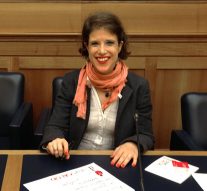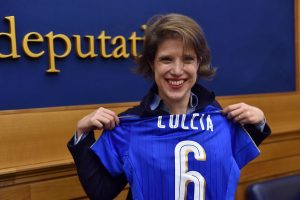
Interview with Hon. Laura Coccia
Editorial 25 March 2017De Rosa: Good morning Hon. Coccia. Could you give us a description of yourself in a nutshell?
Coccia: I was born in 1986 after only 28 weeks of my mother’s pregnancy and I had an infection after some weeks. For this reason I walk, run and live in a peculiar way. When I was 11 I began to practice athletics at school and then I went on debuting in the National team at 19. From 2013 I am an MP of Partito Democratico and Member of the Parliamentary Commission about culture, where I follow the themes related to sport and disability.
DR: The European Union is going through a very difficult crisis, possibly the larger from the moment it was born. What is your opinion about that?
C: Europe already lived an era of walls and wire fences even if someone seems not to remember that. If one hundred years ago, while the young soldiers in Europe were dying on the frontiers between Italy and Austria, or between France and Belgium, someone would have said that those barriers would have no longer exist in a certain amount of time, they would have considered her or him mad. Instead United Europe has been a reality for sixty years. Going back now would be completely out of time and dangerous: being smaller does not mean being safer, it does mean being lonely. Following this hypothesis in fact we should give up not only the single currency, but also European programmes like Erasmus. We would return to the excise dulies.
DR: Do you think that the emergent phenomenon of populism could be defeated or at least softened? How?
C: We need more Europe. And Europe is not only Brussels and the laws made by the Europen Parliament, but we need to build a common ground by which enforcing the awareness of being European citizens, of our history. Populism comes out from stereotypes and prejudice and can be defeated investing on human relations, spreading the concept that building walls is not useful. In a communication context which is dominated by fake news and enforcement of the common fears, it can seem to be the battle of a minority, but I am sure this is not the case.
DR: How making Europe more attractive to the eyes of the citizens?
C: Enforcing the common policies. Europe is perceived only as the authority of the “labels” (thinking about the norms about agriculture, for example). In the reality it is a community of women and men who travel and live quietly together. We should only take conscience of that.
DR: Last question: an advice to the young Europeans who enter the work market today with increasing difficulties.
C: If you can, please travel across Europe, make new experiences, create your own judgement about Europe, use

www.formiche.net
the many possibilities that exist through the European projects. Do not invest others of the duty of speaking about Europe. Because Europe is about each and every one of us.




